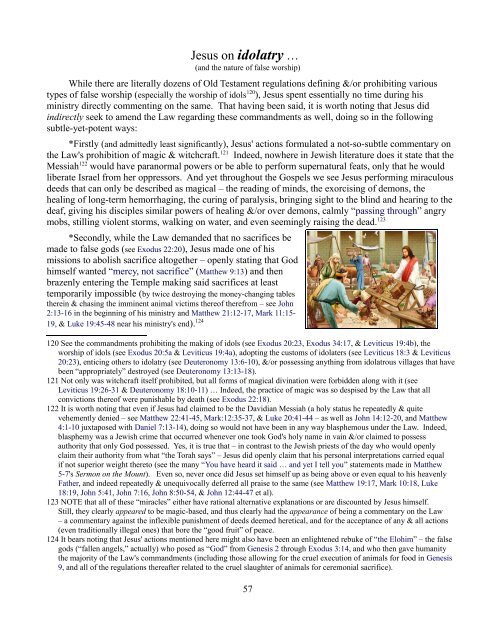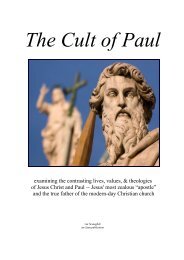Jesus Christ - a most Holy Heretic
An illuminating (and biblically exhaustive) examination of the little-known truth that Jesus Christ was not so much a supporter of the Old Testament laws of his day as he was a radically thorough reformer thereof
An illuminating (and biblically exhaustive) examination of the little-known truth that Jesus Christ was not so much a supporter of the Old Testament laws of his day as he was a radically thorough reformer thereof
Create successful ePaper yourself
Turn your PDF publications into a flip-book with our unique Google optimized e-Paper software.
<strong>Jesus</strong> on idolatry …<br />
(and the nature of false worship)<br />
While there are literally dozens of Old Testament regulations defining &/or prohibiting various<br />
types of false worship (especially the worship of idols 120 ), <strong>Jesus</strong> spent essentially no time during his<br />
ministry directly commenting on the same. That having been said, it is worth noting that <strong>Jesus</strong> did<br />
indirectly seek to amend the Law regarding these commandments as well, doing so in the following<br />
subtle-yet-potent ways:<br />
*Firstly (and admittedly least significantly), <strong>Jesus</strong>' actions formulated a not-so-subtle commentary on<br />
the Law's prohibition of magic & witchcraft. 121 Indeed, nowhere in Jewish literature does it state that the<br />
Messiah 122 would have paranormal powers or be able to perform supernatural feats, only that he would<br />
liberate Israel from her oppressors. And yet throughout the Gospels we see <strong>Jesus</strong> performing miraculous<br />
deeds that can only be described as magical – the reading of minds, the exorcising of demons, the<br />
healing of long-term hemorrhaging, the curing of paralysis, bringing sight to the blind and hearing to the<br />
deaf, giving his disciples similar powers of healing &/or over demons, calmly “passing through” angry<br />
mobs, stilling violent storms, walking on water, and even seemingly raising the dead. 123<br />
*Secondly, while the Law demanded that no sacrifices be<br />
made to false gods (see Exodus 22:20), <strong>Jesus</strong> made one of his<br />
missions to abolish sacrifice altogether – openly stating that God<br />
himself wanted “mercy, not sacrifice” (Matthew 9:13) and then<br />
brazenly entering the Temple making said sacrifices at least<br />
temporarily impossible (by twice destroying the money-changing tables<br />
therein & chasing the imminent animal victims thereof therefrom – see John<br />
2:13-16 in the beginning of his ministry and Matthew 21:12-17, Mark 11:15-<br />
19, & Luke 19:45-48 near his ministry's end). 124<br />
120 See the commandments prohibiting the making of idols (see Exodus 20:23, Exodus 34:17, & Leviticus 19:4b), the<br />
worship of idols (see Exodus 20:5a & Leviticus 19:4a), adopting the customs of idolaters (see Leviticus 18:3 & Leviticus<br />
20:23), enticing others to idolatry (see Deuteronomy 13:6-10), &/or possessing anything from idolatrous villages that have<br />
been “appropriately” destroyed (see Deuteronomy 13:13-18).<br />
121 Not only was witchcraft itself prohibited, but all forms of magical divination were forbidden along with it (see<br />
Leviticus 19:26-31 & Deuteronomy 18:10-11) … Indeed, the practice of magic was so despised by the Law that all<br />
convictions thereof were punishable by death (see Exodus 22:18).<br />
122 It is worth noting that even if <strong>Jesus</strong> had claimed to be the Davidian Messiah (a holy status he repeatedly & quite<br />
vehemently denied – see Matthew 22:41-45, Mark:12:35-37, & Luke 20:41-44 – as well as John 14:12-20, and Matthew<br />
4:1-10 juxtaposed with Daniel 7:13-14), doing so would not have been in any way blasphemous under the Law. Indeed,<br />
blasphemy was a Jewish crime that occurred whenever one took God's holy name in vain &/or claimed to possess<br />
authority that only God possessed. Yes, it is true that – in contrast to the Jewish priests of the day who would openly<br />
claim their authority from what “the Torah says” – <strong>Jesus</strong> did openly claim that his personal interpretations carried equal<br />
if not superior weight thereto (see the many “You have heard it said … and yet I tell you” statements made in Matthew<br />
5-7's Sermon on the Mount). Even so, never once did <strong>Jesus</strong> set himself up as being above or even equal to his heavenly<br />
Father, and indeed repeatedly & unequivocally deferred all praise to the same (see Matthew 19:17, Mark 10:18, Luke<br />
18:19, John 5:41, John 7:16, John 8:50-54, & John 12:44-47 et al).<br />
123 NOTE that all of these “miracles” either have rational alternative explanations or are discounted by <strong>Jesus</strong> himself.<br />
Still, they clearly appeared to be magic-based, and thus clearly had the appearance of being a commentary on the Law<br />
– a commentary against the inflexible punishment of deeds deemed heretical, and for the acceptance of any & all actions<br />
(even traditionally illegal ones) that bore the “good fruit” of peace.<br />
124 It bears noting that <strong>Jesus</strong>' actions mentioned here might also have been an enlightened rebuke of “the Elohim” – the false<br />
gods (“fallen angels,” actually) who posed as “God” from Genesis 2 through Exodus 3:14, and who then gave humanity<br />
the majority of the Law's commandments (including those allowing for the cruel execution of animals for food in Genesis<br />
9, and all of the regulations thereafter related to the cruel slaughter of animals for ceremonial sacrifice).<br />
57

















